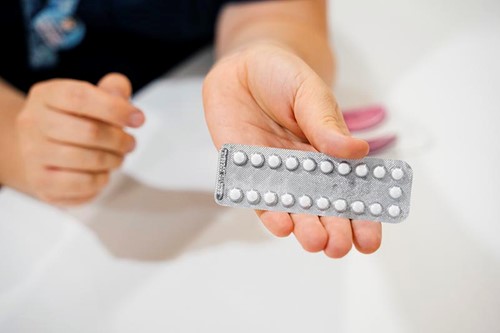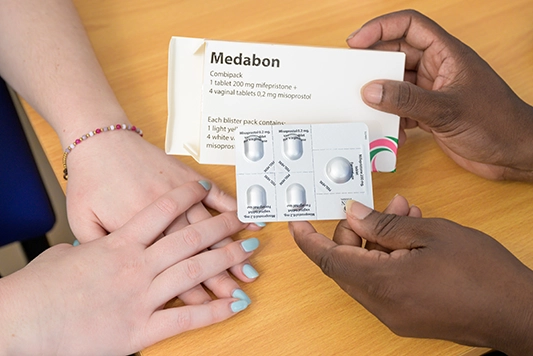As part of your abortion treatment with MSI, we can help you find a method of contraception that best suits your individual needs.
Following an abortion your fertility will return almost immediately. If you would like to start a method of contraception following your abortion, we can help. At your abortion appointment, you will be offered a range of contraceptive methods and we’ll be there to advise and talk through your options with you.
In this blog, Giselle Barnes – Clinical Services Matron and Contraception Nurse in our Bristol clinic – talks through what you can expect during a contraception counselling appointment.
What will we discuss during your appointment?
As part of your abortion care, we will ask if you’ve thought about any plans for future contraception. You may choose not to have contraception as part of your treatment, or know exactly what method you’d prefer. If you aren’t sure which method you’d like but know that you do want to use contraception following your abortion, we will explain all of your options.
One important thing to consider when thinking about contraception is whether you’d prefer a method that you don’t have to remember or think about taking and replacing, or whether you’re happy to take and replace your method more regularly.
If you are happy to take contraception more regularly or everyday, you may wish to start with a method like the contraceptive pill and see how you get on. Whether the combined pill or the progestogen-only (mini) pill is more appropriate would depend on your medical history, which we would check during your appointment. The progestogen-only pill is also what we call a perfect ‘bridging method’ – a temporary method to get you from now until you may want to have a long-acting method, without putting you at risk of an unplanned pregnancy.
If you would rather not have to remember to take contraception every day and know that you do not want to get pregnant for a while, LARC (Long-Acting Reversible Contraception) methods might be best for you. These include the IUD (copper coil), the IUS (hormonal coil), the contraceptive injection and the contraceptive implant.
Another important thing we consider when talking through your contraceptive options are your periods. We ask questions like: Are your periods manageable at the moment? Are they painful? Are they heavy? Different contraceptive methods can impact your period in different ways, so we would work through all of the options and try to find the best for you.
During your appointment with us, we will try to work out a method that suits you best, and then discuss things like risks, benefits, how each method might affect you, and what you can do if the method does affect you in a way you don’t like.
At what point does this appointment take place during your abortion treatment?
This depends on whether you’re having a medical abortion or a surgical abortion.
- Surgical abortion: During your surgical abortion care, the contraception counselling appointment will take place as part of your pre-assessment at the clinic. We can then arrange for contraception like the implant, IUD or IUS to be fitted during or on the same day as your abortion treatment.
- Medical abortion with face-to-face appointment: If you are having a medical abortion with us, we will also talk about contraception during your pre-assessment at the clinic. Some contraceptive methods can be given or fitted during this appointment. If this isn’t possible – for example, if you’d like to have a contraceptive coil fitted – we can arrange a time for you to return to the clinic to have your preferred method fitted.
- Medical abortion telemedicine (pills by post): if you are accessing our at-home abortion services (telemedicine), this contraception counselling appointment will take place during your call with a nurse, who will arrange an appointment at one of our clinics should you wish to have a method fitted following your abortion. If, during this call, you decide that you would like to start taking the contraceptive pill (either the combined pill or the progesterone-only pill), this can be sent out along with your abortion pills.
If you choose not to start a method of contraception during your abortion care or would prefer to go away and think about your options, call your GP or be in touch with a sexual health clinic, you will be able to access contraception services with us for three months following your treatment.
We are also able to offer independent contraception services in some areas of England, if you live in these areas and decide you’d like to start a method of contraception in the future. To learn more about our independent contraception clinics, click here: Independent Contraception Clinics
How long is the fitting appointment?
The length of the appointment largely depends on the method you choose. If you choose to have the contraceptive implant, then the whole appointment should take around 10 – 15 minutes, including discussion. If you choose to have the contraceptive injection, the appointment is shorter – around 5-10 minutes, including discussion. If you choose to have the coil – either the IUD or the IUS – the appointment is a little longer, due to the use of anaesthetic – around 20 – 30 minutes, including discussion.
At MSI we offer anyone opting for a coil a choice of three types of local anaesthetic, including: a gel, a spray and an injection, as well as the option of taking painkillers, such as ibuprofen, an hour or two before the procedure.
How quickly does contraception work?
If you start any contraceptive method within five days of your abortion, you will be protected against pregnancy immediately.
An IUD (also known as a ‘copper coil’) is always effective immediately.
The progesterone-only pill (also known as the ‘mini pill’) is always effective after 48 hours.
If you start any other methods (including the combined pill, the implant, the injection and the IUS) after five days, you will need to use additional contraception (such as condoms) for seven days.
If you haven’t quite made up your mind about contraception or we can’t give you what you want at the time, you may want to consider having a temporary method to tide you over. We call this a bridging method, to get you from now until you get the method of your choice without putting you at risk of an unplanned pregnancy. You could have contraceptive pills or the injection as a bridging method so please speak to our team about this.
When can you start contraception following an abortion?
The best time to start contraception after your abortion depends on the contraceptive method.
The best time to have a LARC method (IUD, IUS, Implant or Injection) is immediately after the pregnancy has passed. If this isn’t possible or you haven’t quite made up your mind about contraception, we can provide you with a short-term method (such as the mini pill) if you would like.
If you are collecting your abortion tablets in person you may be able to have your implant fitted at this time, please ask us if you are interested in this option.
If you are having a medical abortion and want to start taking the progesterone-only pill (mini pill), combined contraceptive pill, contraceptive patch or the contraceptive ring, you can start these methods the day after taking the second set of tablets.
CHOICE – MSI’s digital contraception counsellor
At MSI Reproductive Choices UK, we know that learning about contraception makes people better equipped to have healthier, safer and more enjoyable sex lives, so we have launched a personalised contraceptive counsellor. Fill out a questionnaire about your lifestyle, preferences, needs and medical history, and you’ll see a list of the most appropriate contraception options for you.
Check out our Contraception Counsellor online tool here.
To read more from Giselle, click on the links below:







